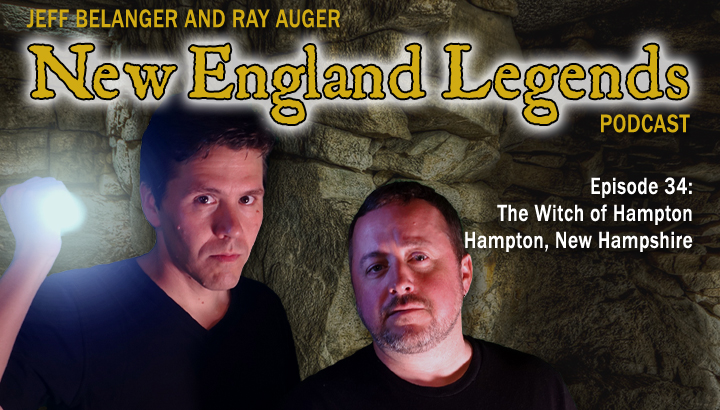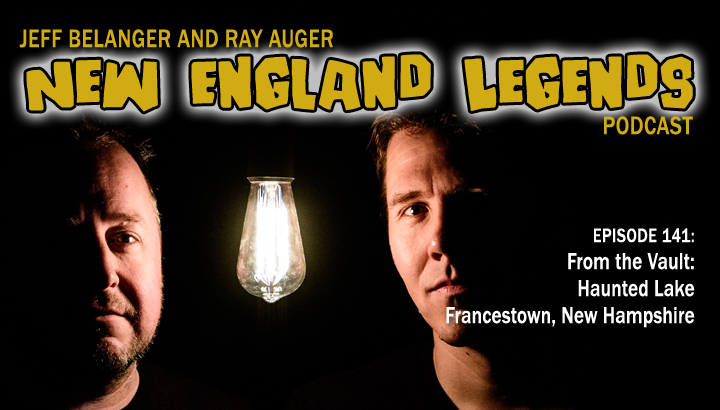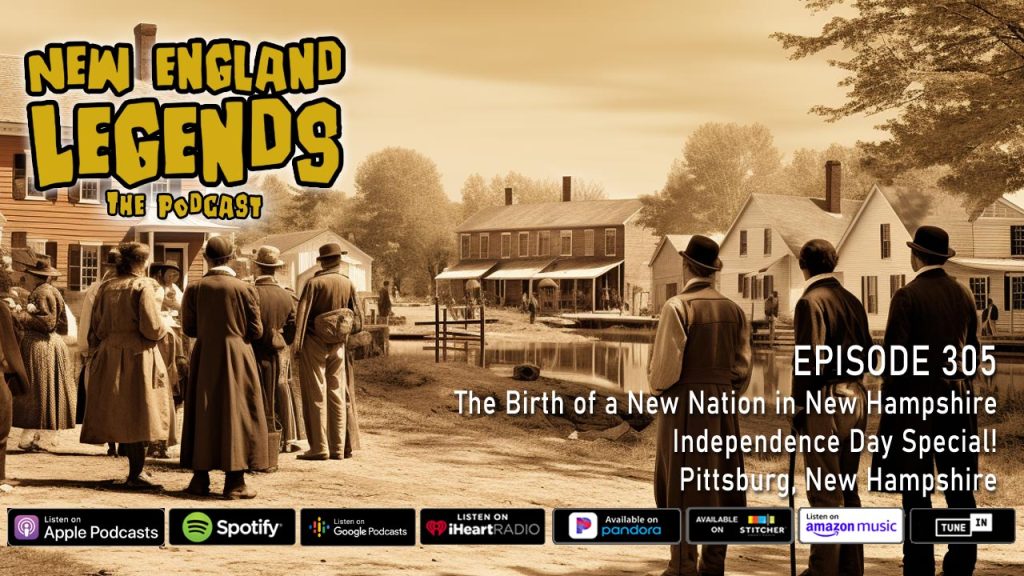
In Episode 305 Jeff Belanger and Ray Auger spend Independence Day heading to Pittsburg, New Hampshire, to witness the birth of a new democratic republic born from the injustice of taxation without representation. This new nation caught the attention of the world and became a shining beacon of democracy – even if the Republic of Indian Stream only lasted from 1832 to 1835.
Read: The Indian Stream Republic and Luther Parker by Grant Showerman, PhD
BECOME A LEGENDARY PATRON:
https://www.patreon.com/NewEnglandLegends
CREDITS:
Produced and hosted by: Jeff Belanger and Ray Auger
Edited by: Ray Auger
Guest Voices: Carl Hutchinson and Michael Legge
Theme Music by: John Judd
SUBSCRIBE TO THE PODCAST FOR FREE:
Apple Podcasts/iTunes | Google Podcasts | Spotify | Pandora | Amazon Podcasts | TuneIn | iHeartRadio
JOIN OUR SUPER-SECRET:
New England Legends Facebook Group
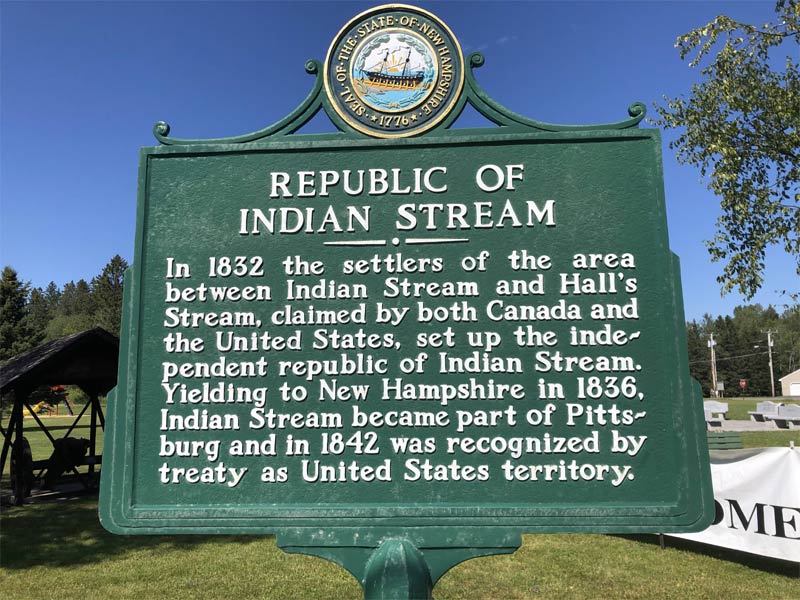
Republic of Indian Stream historic marker in Pittsburg, New Hampshire.
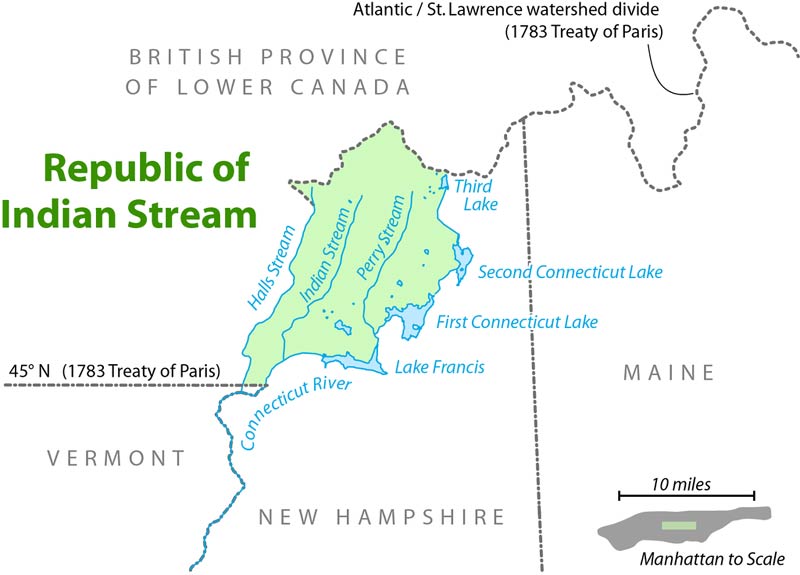
Map of the Republic of Indian Stream in Pittsburg, New Hampshire.
EPISODE TRANSCRIPT:
*A note on the text: Please forgive punctuation, spelling, and grammar mistakes. Like us, the transcripts ain’t perfect.
[DRIVING]
RAY: Okay, we are WAY up here in New Hampshire, Jeff. We can’t be very far from the Canadian border.
JEFF: No. We’re maybe 5 to 10 miles away from the border. But we are getting close to our destination. We just entered the town of Pittsburg here on Route 3. It’s the perfect place to celebrate Independence Day because it was here that a new nation was born long ago. A beacon of democracy for all to see.
RAY: Pittsburg?!
JEFF: A little confusing, I know. Pittsburg, New Hampshire, has no H at the end, making it different, and much smaller than the more famous Pittsburgh, Pennsylvania. Plus, I don’t think the folks in Pittsburg, New Hampshire, put French fries on their sandwiches like they do in Pennsylvania.
RAY: That doesn’t mean they shouldn’t at least try it.
JEFF: Agreed. Anyway, pull over here across the street from the Pittsburg town green. We’re about to leave the country.
[CAR STOPS DOORS CLOSE]
RAY: What do you mean “about to leave the country?” We’re standing at the town green of Pittsburg, New Hampshire.
JEFF: That’s right, but this wasn’t always New Hampshire.
RAY: I get it. So the Canadian border used to be over here?
JEFF: Well yes, but we’re not going to Canada either. We’re going to explore the epicenter of where colonists broke away from tyranny and formed a new democratic republic that could serve as a shining beacon for the world to see. This Independence Day we’re going to witness the birth of a nation.
[INTRO]
JEFF: I’m Jeff Belanger and welcome to Episode 305 The Independence Day Special of the New England Legends podcast.
RAY: And I’m Ray Auger. We’re thrilled you’ve joined your townie buddies Jeff and Ray on an adventure through a very strange place we call New England. We’re always on the hunt for strange tales of ghosts, monsters, aliens, roadside oddities, and strange history. And we get most of our story leads from you, so please feel free to reach out to us anytime through our Web site. We love hearing from.
JEFF: And we love when you share this podcast with your friends. Great things happen when we build this community. We’ll go searching for this beacon of democracy right after this quick word from this sponsor.
[CAR DRIVING BY]
RAY: Okay, Jeff, the Pittsburg, New Hampshire. The population is less than a thousand people today. But the town green is a pretty spot. There’s a white gazebo, a memorial to local war veterans in front of some flags. There’s a few benches and trees. It looks pretty similar to lots of small-town greens. A great place for a picnic, or outdoor music, or festivals.
JEFF: Agreed. And this region of northern New Hampshire is beautiful. Especially in the summertime.
RAY: There’s a lot to like about New Hampshire: Cheap booze, no sales tax, and the most badass license plate slogan in the United States.
JEFF: Live Free or Die. Absolutely. From the famous General John Stark quote. And if we’re talking about the nation’s lowest tax burdens, New Hampshire ranks third. Not too shabby. Taxes, it turns out, was the reason for all the fuss regarding the Republic of Indian Stream.
RAY: Nobody has ever has or ever will like taxes. Wars get fought over them. Like… for example… America’s war for independence.
JEFF: Very true! And borders get redrawn because of those wars. Ever try to tax someone’s tea in Boston? It doesn’t go well.
RAY: No it doesn’t.
JEFF: So there was a time back in the early 1800s, when this land right where we’re standing was caught in a bureaucratic struggle. Canada, which was a British territory at the time, believed they owned this land based on the 1783 Treaty of Paris. And the United States also believed they owned this land based on the 1783 Treaty of Paris.
RAY: They can’t both be right.
JEFF: Nope. The confusion came because that treaty states the Canadian-U.S. border would be drawn at quote “the northwesternmost head of the Connecticut River.” Which seems simple enough until you get up here and see that there are three tributaries that feed off the head of the Connecticut River. So there was about 290 square miles of grey area here. Both Britain and the United States assumed the land was theirs because they both want as much land as possible. And both sides sent in tax-collectors and debt-collecting sheriffs.
RAY: I can’t imagine that was well-received by people living here.
JEFF: Not at all.
RAY: So you could have two people knocking on your door the same day collecting taxes for two different governments.
JEFF: Right.
RAY: Yeah, I can’t imagine I’d stand for that.
JEFF: Nope. You wouldn’t. And neither did the people living here. So let’s head back to 1832 and meet the people who referred to themselves as The Streamers.
[TRANSITION]
RAY: It’s July 4th 1832.
[FIREWORKS]
RAY: And America is celebrating its Independence with fireworks, picnics, and music. There are still old-timers around who were young during the American Revolution. They remember the sacrifices their families and parents and grandparents made for independence. It’s a proud time. But here in northern New Hampshire near the Connecticut River, Lake Francis, and the Connecticut Lakes, people are angry.
[GRUMBLING PEOPLE IN A ROOM]
JEFF: They’re beyond angry. The people who live in this region they call Indian Stream want to celebrate their independence. A time when we commemorate breaking away from England because of taxation without representation, among other reasons. But these folks find themselves in the unique place of being caught between two countries. Both of which are taxing them.
RAY: It’s been years of confusion in this grey area caught between two countries. Meanwhile, folks living here are just trying to raise their families and get by just like everyone else. Neither the United States or Britain are quite sure how to deal with them, but both countries are positive they want the tax revenue.
JEFF: On this particular morning, the British sheriff comes to town. He’s been summoned because a local man named Luther Parker who owns a mill and store near Fletcher’s Mills near the mouth of Back Lake brook has been accused of holding a quantity of lumber that belongs to one of his customers. Parker believes he’s owed money, so he’s withholding the lumber. His customer sees it differently.
RAY: This is the kind of legal dispute that’s usually sorted out in a local or regional court.
JEFF: Exactly.
RAY: But if you have no country, you have no court.
JEFF: And now we have a British sheriff from the Canadian side coming for Luther Parker to settle this dispute.
SHERIFF: You sir, are under arrest.
JEFF: Luther asks in whose name is he under arrest.
SHERIFF: In the name of the King!
JEFF: Is the reply.
RAY: Luther Parker is hauled off in shackles to Canada to sit in jail at a judge’s house while they await the hearing.
JEFF: Meanwhile, back home, locals are incensed. They’re not sure who is in the right or in the wrong in terms of the legal dispute, but they DO know a British sheriff just arrested one of their own and took him away. In short, this will not stand.
RAY: A posse forms in town.
[HORSES RIDING]
RAY: And invades Canada with the judge’s house as their target.
[MUSKETS FIRING]
RAY: The posse shoots at the judge’s house.
[MUSKETS FIRING]
RAY: They don’t intend to kill anyone, just get the attention of say… the judge… Canada… the United States. President Andrew Jackson… and the King of England.
JEFF: THAT mission was accomplished. The posse brings Luther Parker back home, but in doing so they create an international incident over a petty crime, but that incident forces this community to decide that Indian Stream shouldn’t belong to Canada, Britain, or the United States. It’s July 9, 1832. They draw up a constitution.
STREAMER: The people inhabiting the Territory formerly called Indian Stream Territory do hereby solemnly and mutually agree with each other to form themselves into a body politic by the name of Indian Stream and in that capacity to exercise all the powers of a free, sovereign, and independent state, so far as it relates to our own internal Government till such time as we can ascertain to what government we properly belong.
RAY: And the Republic of Indian Stream is born. They don’t intend to be their own country forever. Just until the United States and Britain can sort out where the border should lie.
JEFF: To their credit, the Streamers, as they call themselves, don’t quit at this introductory paragraph. They write a lengthy document outlining everyone’s rights.
STREAMER: Article First – All men are born equally free and independent therefore all government of right originates from the people, is founded in common consent and instituted for the public good.
Article Second – Every man has a natural, essential, and unalienable right to worship God according to the dictates of his own conscience and reason, and is not accountable to any human tribunal for his religious opinions or practices, provided he does not encroach upon the civil or religious rights of others. [FADE OUT]
JEFF: They go on and on outlining legal rights, how to settle disputes, how often to vote, and so on.
RAY: This language doesn’t sound radically different than the United States Constitution and Bill of Rights.
JEFF: No, it’s not that different at all. So this new nation called the Republic of Indian Stream encompasses about 290 square miles. Being sovereign, they’re not entitled to the protections of either the United States or Britain. But they didn’t feel like they needed that protection anyway.
RAY: The Streamers operate their little democracy. They hold elections, they allow residents to vote on issues, and any taxes collected go directly to benefit their own community.
JEFF: For three years the Republic of Indian Stream survives as its own democratic nation until August 5, 1835 when New Hampshire and the United States annex the territory. The Streamers vote to accept inclusion into New Hampshire…
[JUDGE GAVEL BANGS THREE TIMES]
JEFF: And the motion passes. The Republic of Indian Stream changes its name to Pittsburg and becomes the largest township in New England by land area. And that brings us back to today.
[TRANSITION]
RAY: And Pittsburg is still the largest township in New England by area.
JEFF: And here on the town green sits an official New Hampshire state historic marker giving a nod to this short-lived country. Give it a read, Ray.
RAY: Okay, it says: Republic of Indian Stream. In 1832 the settlers of the area between Indian Stream and Hall’s Stream, claimed by both Canada and the United States, set up the independent republic of Indian Stream. Yielding to New Hampshire in 1836, Indian Stream became part of Pittsburg and in 1842 was recognized by treaty as United States territory.
JEFF: Most of what we know about this story comes from the 1915 book titled: The Indian Stream Republic and Luther Parker published by the New Hampshire Historical Society.
RAY: If you’re a history nerd, the book is worth reading. It details the whole story and the constitution they wrote.
JEFF: All but forgotten, a democratic nation formed right here in northern New Hampshire. They saw injustice, double taxation, and that their residents could be arrested by either of two countries, and they opted out. They declared their independence! They made their own fair rules, and kept order amongst themselves.
RAY: You gotta love that independent spirit. They used pen and paper to right a bureaucratic wrong… and a new nation was born.
[OUTTRO]
JEFF: Happy Independence Day, Ray!
RAY: Happy Independence Day, Jeff!
JEFF: And that brings us to After the Legend where we take a deeper look at this week’s story and sometimes veer off course.
RAY: After the Legend is brought to you by our patreon patrons! Our patrons make this show happen. They financially support us because they know great content isn’t free. They help us with our hosting costs, travel costs, marketing, and so much more. We couldn’t do it without them. It’s just $3 bucks per month and you get early access to new episodes plus bonus episodes and content that no one else gets to hear. Just head over to Patreon.com/NewEnglandLegends to sign up.
If you’ve got a story you’d like us to check out, please reach out to us anytime through our Web site. Most of our story leads come from you. Also, we truly appreciate it when you take a minute to post a review for us. Those reviews help others find us in a crowded sea of podcasts. We appreciate all of us being in this mission together.
We’d like to thank Carl Hutchinson and Michael Legge for lending their voice acting talents this week. Thank you to our sponsors and our patrons. And our theme music is by John Judd.
Until next time remember… the bizarre is closer than you think.


